Russian plane crash in Sinai: The consequences
- Published
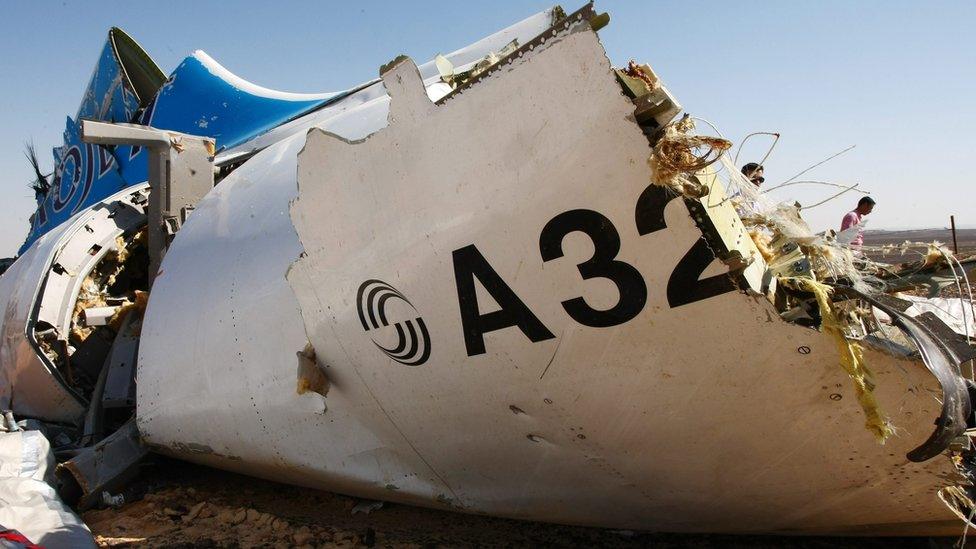
Some 224 people, mostly Russians, died when a Metrojet airliner crashed into the Sinai desert
If investigators confirm that it was a bomb that brought down a Russian airliner over Egypt last week, the consequences of the explosion will spread far beyond the remote patch of desert into which the debris crashed.
It will have been the first successful terror attack on a passenger jet for more than a decade, and the loss of 224 foreign civilians will have opened up a new front in the war against the so-called Islamic State group.
Relations between Russia, Egypt and the UK are already under strain, and Egypt stands to lose billions of pounds in tourism revenue if it is confirmed that IS was able to smuggle a bomb through one of its most popular resorts.
Here BBC correspondents look at the potential fallout for some of the parties in an increasingly complex international incident.


Security in Sinai - Frank Gardner, Security Correspondent
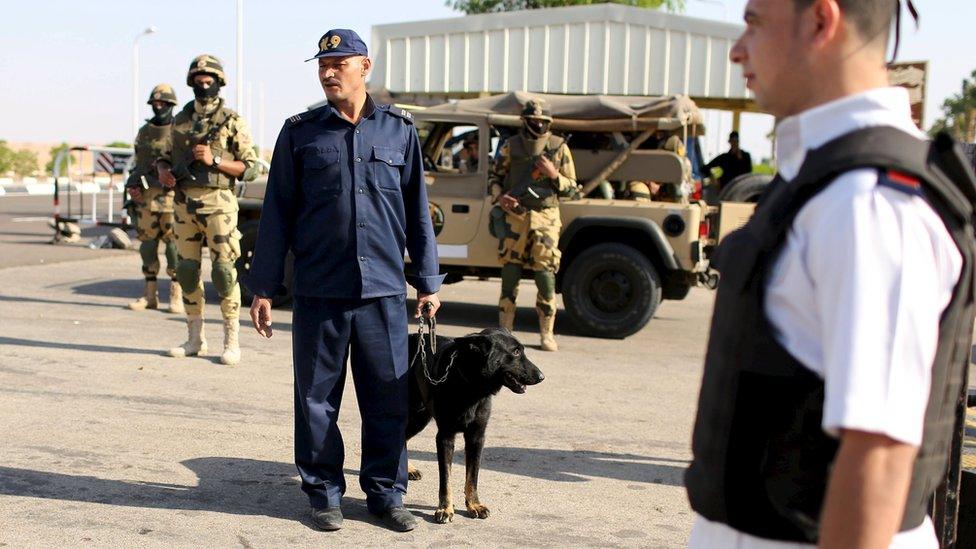
Security has been stepped up in Sharm el-Sheikh following the attack
Egypt has launched its own intelligence investigation into how a bomb could have been placed onboard the airliner. A senior Egyptian official who asked not to be named has told the BBC that every lead was being followed up, and security at its airports vastly increased, even though the official crash investigation has yet to conclude.
Britain has still not shared its intelligence with Egypt on the suspected bombing of the Metrojet airliner, said the official.
The official said its intelligence service was looking into every possibility of how someone could have placed a bomb inside the luggage compartment of the doomed plane.
This included going through CCTV footage from the airport's baggage area, which had not yet revealed anything suspicious, and questioning employees. Western counter-terrorism experts suspect that jihadists in the Sinai were able to penetrate airport security to target the Russian plane and there is a belief that Islamic State's affiliate in Sinai may have been able to bribe an airport employee.
But the senior Egyptian official said that foreign airliners at Sharm el-Sheikh airport were never boarded by Egyptian personnel unless requested by the airline. He said that before the crash only 20%-30% of airport employees were searched but that figure had now been raised to 100%, with workers being screened both on entry and exit.
Cars were being stopped half a mile from the terminal and checked for any explosive traces, he said, and planes on the runway were being guarded around the clock by a cordon of Egyptian military and security personnel. Egypt is willing to pay any price to prevent this happening again, said the official.

A blow to Egypt's economy - Sally Nabil, Sharm el-Sheikh
How important is tourism to Egypt's economy?
"The picture is getting grimmer, we don't know what to do," a receptionist in one of Sharm el-Sheikh's luxurious hotels told me.
The resort is one of Egypt's main tourist hubs and it had been preparing for a busy season. At this time of year, this beautiful spot is usually bustling with tourists who come to enjoy the warm sun and the lovely beaches. But now everything has changed.
Tourism accounts for nearly 13% of Egypt's GDP - about £24 billion ($36bn) - and provides nearly 12% of the country's jobs. An exodus of British and Russian tourists from Sharm el-Sheikh will leave many Egyptians wondering about their future.
Most of the holidaymakers who visit the Egypt every year come from Russia and the UK, many of them to stay in Sharm el-Sheikh. But not any more. Flights have been suspended to this coastal city and all the remaining tourists are getting out.
As I walk around, many of the restaurants and cafes overlooking the Red Sea are all but empty. "We pay rents, electricity, taxes and salaries," a restaurant owner tells me. "If we don't have enough tourists, how can we cover all these expenses?"
After the crash, it is hard to tell if the industry will recover any time soon.

International tension - Paul Adams, Diplomatic Correspondent
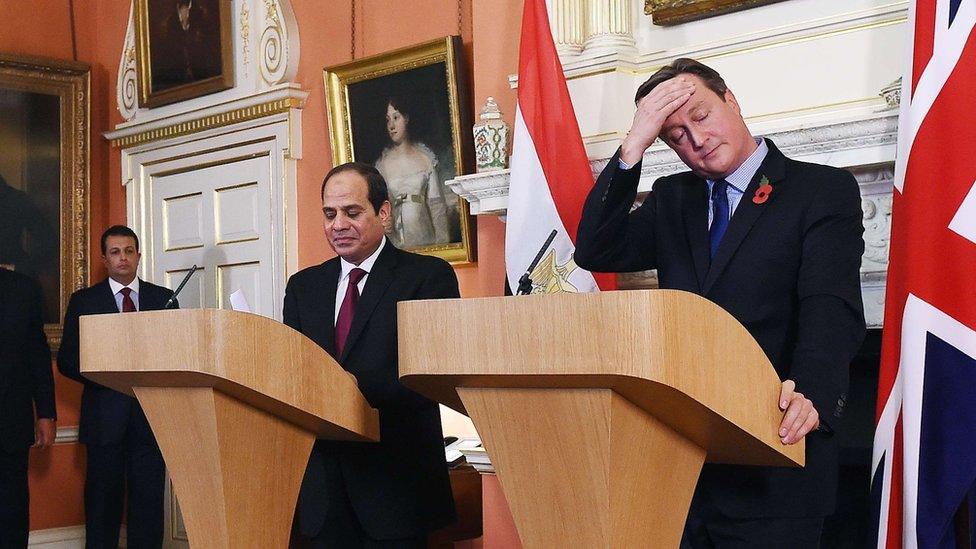
The crash came shortly before a scheduled visit to London by Egyptian President Abdel Fattah al-Sisi
Even as funerals take place and stranded tourists wonder how long it will take them to get home, the wider ramifications are still sinking in. And they are enormous.
If it emerges, as many now suspect, that Islamic State militants planted a bomb on board the Russian plane, it opens a whole new front in the growing international campaign against the jihadist group.
Officials will need to know where those responsible acquired the know how to carry out such an attack. Was it conceived, planned and executed entirely within the lawless boundaries of the Sinai Peninsula, or did it draw on expertise from elsewhere?
IS has never brought down a plane before, so some are wondering whether the group reached out to its arch rival, al-Qaeda. If so, this would represent another troubling development.
For all the criticism surrounding last week's sudden British decision to suspend flights, the fact that both the Russians and the Egyptians now appear to agree that terrorism was the most likely cause could inject a degree of common purpose into the international community's fractured efforts to confront IS.
But intelligence sharing is a sensitive business. The British government was criticised by Russian and Egyptian officials for not sharing its information or explaining its actions, causing considerable tension between London and Cairo.
Intelligence agencies are extremely reluctant to share what they know, for fear of divulging sensitive sources and methods, or when the vital information comes from another agency. Reports that British officials were provided with Israeli intelligence intercepts may help to explain why London was so tight-lipped.

Problems for Putin? - Oleg Boldyrev, BBC Moscow
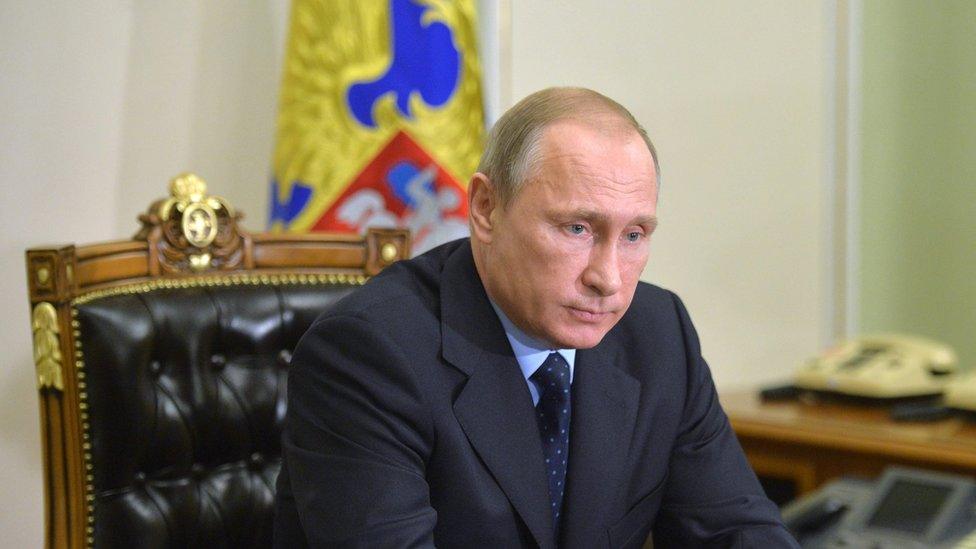
Russia initially played down reports of a terror attack, but later suspended flights to Egypt
For thousands of Russians, being forced to return baggage-free from their Egyptian holiday will leave the unmistakable impression that terrorism was behind the death of more than 200 of their compatriots the previous week.
Yet, at home, government officials insist that all explanations for the Sinai crash are still on the table. Having an airliner blown out of the sky in revenge for Moscow's air campaign against the Islamic State poses uncomfortable question for Vladimir Putin - have Russian authorities calculated the wider risks of sending its planes on bombing missions in a region so unstable and so loved by millions of Russian tourists?
But public opinion in Russia is very pliable and responds well to the line taken by state-sponsored TV. Government channels continue to trumpet Russian air force successes in Syria and stress the importance of fighting Islamic extremism, even miles away from Russian shores. There is little concern over the complete lack of public or parliamentary discussion.
If air crash investigators conclude that the Metrojet plane was indeed brought down by a bomb, it as quite possible the atrocity will be used as an argument for stepping up, rather than limiting, Russia's campaign in Syria.

Safeguarding air travel - Richard Westcott, Transport Correspondent
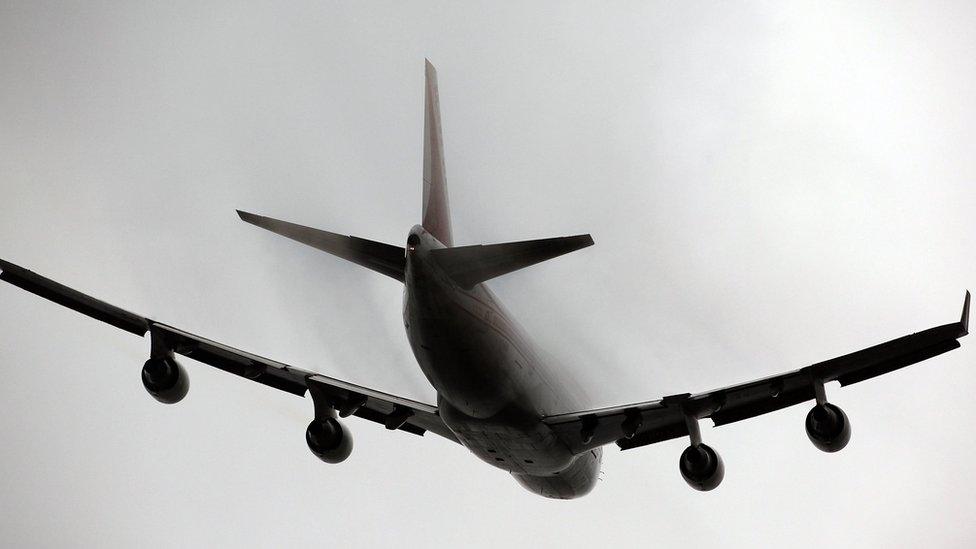
Will proof of a terror attack against Flight 9268 impose yet more restrictions on air travellers?
We're all used to the liquids ban on planes, and you've probably had to take your shoes off before going through security. Both restrictions came about because of attack plots on airliners.
So the big question now is: If this was a terror attack, will we see yet more rules put in place at airport security? And will it mean even longer queues?
It all depends on whether this was a bomb and if it was, how they managed to get it on board. Already, there has been a lot of focus on the security screening at Sharm el-Sheikh airport, or the possible lack of it.
But as one expert, Philip Baum, pointed out, when screening at US airports was probed recently, in 67 out of 70 tests inspectors managed to smuggle things through, including dummy explosive devices.
There is also the chance that an airport worker may have helped, but that could be hard to prove. There are plenty of countries where staff are badly paid and corruption is rife. You can screen staff but not all attacks are carried out by people with a previous record.
And what about the other things carried onto planes? Meals for example. Do you then try to screen the staff in the food companies?
The UK's foreign secretary has suggested that if this crash was down to a bomb, the government will look again at airport security in countries where Islamic State is active. That could include Turkey, for example. But it's too early to say whether all this will translate into yet more layers of airport security, and therefore longer queues, around the world.